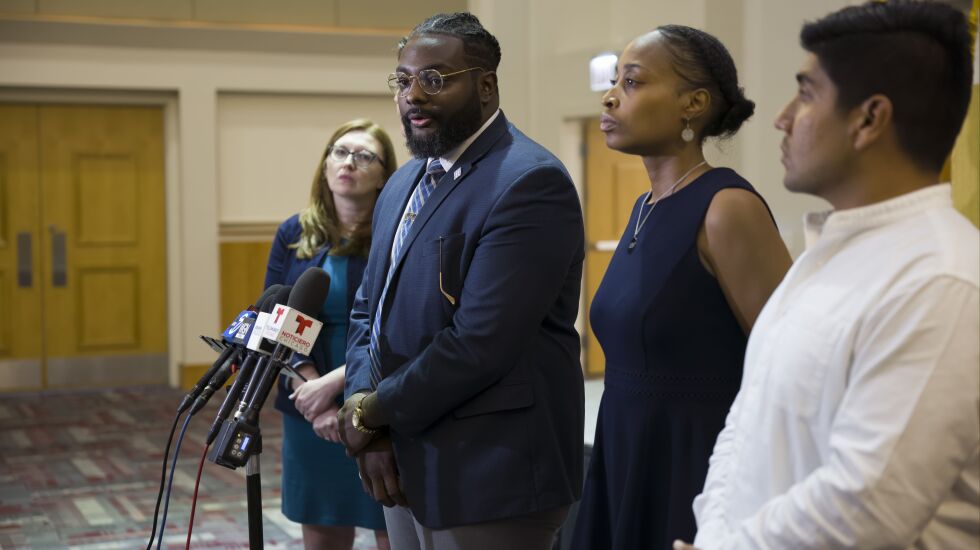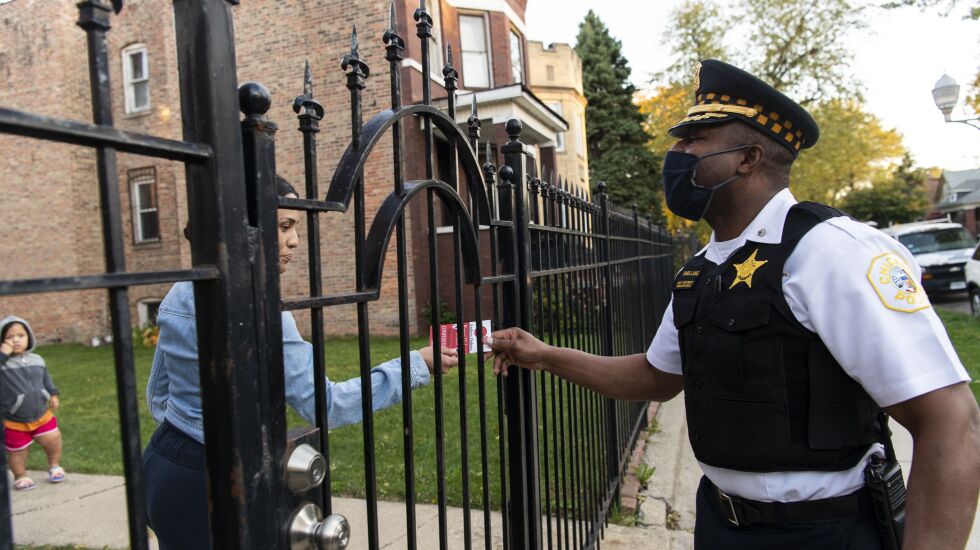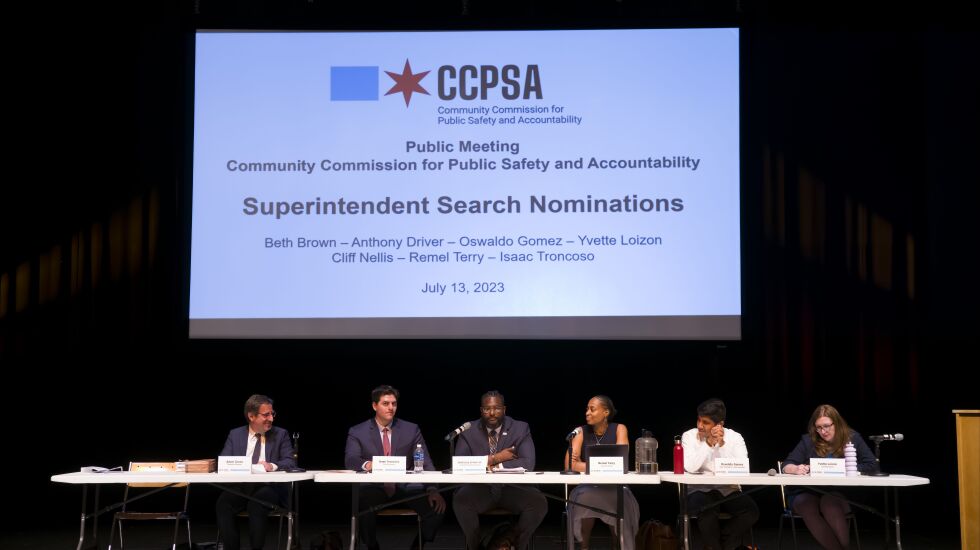Larry Snelling, the Chicago Police Department’s 54-year-old counterterrorism chief, is Mayor Brandon Johnson’s choice to be the city’s new top cop.
Determined to improve rock-bottom police morale, Johnson chose a 29-year CPD veteran he apparently believes is best equipped to do just that over two other finalists: Angel Novalez, the 50-year-old head of CPD’s Office of Constitutional Policing and Reform; and Madison, Wisconsin, Police Chief Shon Barnes, 49.
Snelling was formally introduced by the mayor on Monday. During that news conference, Snelling outlined his three top priorities: improving officer wellness and training; using Johnson’s “whole of government” approach to reduce violent crime with a heavy focus on “forgotten” crime victims; and, rebuilding shattered trust between citizens and police by making every cop a community policing officer.
“We need to make sure that we have the best-trained and the most well officers and well-taken-care-of officers when we put them out in the community, because when these officers feel good about themselves, they feel good about the department. When they feel good about the job that they’re doing, they’ll feel good and great with the community,” Snelling said.
“In order for our officers to love someone else, we have to love them.”
Snelling said the training of Chicago Police officers should not simply be an exercise in checking boxes to “meet compliance” with the consent decree outlining the terms of federal court oversight over the Chicago Police Department.
“When we do that, we lose the quality in that training. Officers want good training. And when they get it, they want more of it. However, if we’re just looking to get officers through 40 hours of training, then what we’re doing is we’re putting officer through training — but we’re not training officers.”
In a statement posted Sunday to X, the social media platform formerly known as Twitter, Johnson said his selection of Snelling marks “a new chapter in our journey to create a better, stronger and safer Chicago.”
“Chief Snelling is a proven leader who has the experience and the respect of his peers to help ensure the safety and well-being of city residents, and address the complex challenges we all face related to community safety,” Johnson said.
“I am confident that by working collaboratively with the superintendent and all vested stakeholders inside government and beyond, we can develop and implement comprehensive strategies that address the unique needs of each community and improve public safety throughout the city.”
Snelling’s appointment to the $260,004-a-year superintendent’s job must be confirmed by the City Council. Before that crucial vote, he is expected to be introduced to Chicago residents during at least one public hearing where he will face questions.
If confirmed, Snelling will take over from interim Supt. Fred Waller, who was praised recently by Johnson for giving up his summer to hold down the fort while a permanent replacement was chosen.
Waller’s work on “building the morale of our rank-and-file members has been absolutely remarkable,” the mayor told reporters. “Quite frankly, it’s something that some people didn’t believe we could do.”
Snelling did not respond to requests to comment Sunday.
— Mayor Brandon Johnson (@ChicagosMayor) August 13, 2023
In a statement, Waller said, “I want to congratulate Chief Larry Snelling on being selected as the next Superintendent of Police by Mayor Brandon Johnson. Being able to lead the Chicago Police Department is the honor of a lifetime and I am confident he will lead with fairness and integrity.”
Snelling must restore the trust of officers who quickly lost faith in David Brown, the retired Dallas police chief chosen by then-Mayor Lori Lightfoot. Many in the rank and file never believed Brown had their backs or understood Chicago.
Snelling’s to-do list also includes speeding compliance with a federal consent decree, restoring trust between citizens and police, driving murders and shootings down and homicide clearance rates up and stopping a troubling spike in North Side robberies.
The police department also issued a statement on X that credited Snelling’s experience, noting he’ll “lead CPD as we continue building community, strengthening officer wellness and making our community safer.”
“Chief Snelling will continue to pass on his experience to the next generation of police officers as our next superintendent,” the department said.
‘He’s hard on us. But he’s also fair.’
Snelling has been the safe choice — and odds-on favorite — once the Community Commission for Public Safety and Accountability announced the three finalists on July 13. With police morale in the tank, Johnson is determined to improve it, and Snelling has the best chance to do just that, having already trained so many officers as a tough-love fitness instructor at the Chicago Police Training Academy.
Anthony Driver, president of the new Community Commission for Public Safety and Accountability, led the exhaustive, first-of-its kind search for the finalists.
Driver had repeatedly spoken about his desire to find a transformational leader for the police department. On Sunday, he told the Sun-Times he “couldn’t be more happy” with Johnson’s decision to choose Snelling.
Not only was Snelling’s resume impressive, Driver said he was engaged during interviews and demonstrated certain “leadership traits” the commission president even wanted to learn for himself. But Driver was also taken by the range of stakeholders who went to bat for Snelling.
“He was the one person that no matter which room we went in — from conservative rooms to progressive rooms to prosecutors to rank and file to community activists to the faith community, you name it — they all had great things to say about Larry Snelling,” Driver said.
He noted that Snelling is “a very involved person” who can help boost morale and won’t simply “lead from 35th Street,” referring to the city’s public safety headquarters at 35th Street and Michigan Avenue.
“I believe he’ll be out in the community. I believe he’ll be out interacting with officers,” Driver said. “I believe that he will lead from the front, and I think that’s what a lot of folks are looking for.”
That echoes what Driver told the Sun-Times last month.
“The variety of people who speak highly of him — I found that to be really impressive. From community folks,” Driver said then. “I don’t know the officer’s name who pulled me aside at Officer [Aréanah] Preston’s funeral, but what she said to me is, ‘That’s our guy. He’s hard on us. But he’s also fair. And he pushes us to be our best.’ … Do I think he would have a positive effect on officer morale? No question.”

Snelling also delivered an “impassioned” and “compelling” speech to commission members comparing what he called “cowardly leadership” to “courageous leadership.”
Driver wouldn’t cite Snelling’s examples of cowardice. But he did relate Snelling’s story about serving as Englewood District commander during the tumultuous days of civil unrest that followed the 2020 murder of George Floyd.
“Some misinformation had got out and there were hundreds of community members who were very upset thinking that a child had been shot multiple times by the police department. There were about a hundred or so officers out there. That’s my neighborhood. … I was out there on the scene. It was a very contentious moment. … I thought that my community was gonna go up in smoke,” Driver said.
“Through his relationships with that community and the people that he knows, he was able to work with them. He actually got all of the officers to leave off of that block. He gave the accurate information to the community. And nobody got hurt in that situation. And this is in the middle of 2020 when things were very tense. … That’s an example of courageous leadership.”
It was in that Englewood District — in the area where he lived — that Snelling started his CPD career as a patrol officer.
Proven leader, alderperson says
Ald. Matt O’Shea (19th) is one of the police union’s staunchest City Council supporters. His Far Southwest Side ward is home to scores of Chicago police officers.
O’Shea said he saw Snelling’s leadership skills first-hand two years ago when he organized a prayer vigil outside the Morgan Park police district after the murder of Officer Ella French. French was fatally shot and her partner, Carlos Yanez Jr., was critically wounded after they pulled over an SUV with expired plates at 63rd and Bell.
After the vigil, O’Shea saw a dozen grief-stricken young officers surrounding Snelling, who was their deputy chief.
“You just watched this dynamic of this guy in uniform who clearly held the respect of all of these young police officers who were hanging on his every word. I’m talking really young — 22-, 23-, 24-, 25-year-old cops who all worked for him standing around and talking to him,” O’Shea recalled. “I remember thinking to myself, ‘Look at this guy. … Here is someone who’s clearly respected by the rank and file. Here is someone that these young officers looked up to as a role model, as a mentor.’ I saw that and said to myself, ‘Wow. That’s what we need. … Wouldn’t it be great to have that in leadership of the department?’”
What police officers crave most after Lightfoot’s failed experiment with Brown, an outsider, is a leader. They will have that in Snelling, O’Shea said.
Snelling “commands the room. He exudes leadership by his mere stature. The way he carries himself. The way he speaks. He’s a proven leader,” O’Shea said. “The men and women on the Chicago Police Department — they want that. They want a strong leader that they know is gonna walk the walk as opposed to just talking the talk. And they know that Larry Snelling is gonna have their back. Now, more than ever, they need to believe in that.”

Beyond boosting morale, Snelling is also the right choice because he’s from Chicago, said Lance Williams, professor of urban studies at Northeastern Illinois University.
“It’s difficult to be sensitive to the needs of the community if you’re not from there, especially as it pertains to violence,” Williams said. “It’s important to know the culture of the streets.”
Brown’s tenure proved how important it is for a mayor to choose the right police superintendent — and the disastrous political consequences of picking the wrong one.
During a mayoral campaign dominated by the issue of violent crime, all eight mayoral challengers vowed to fire Brown, while Lightfoot refused to dump him. Even some of her closest council allies pleaded with her to pull the plug.
John Catanzara, the president of the Chicago Fraternal Order of Police, said he was pleased with the mayor’s choice and offered no criticism.
“We’re glad it’s somebody that we know and know we can work with, somebody who I think the membership trusts and has faith that there’s hope in this department still,” Catanzara said.
He noted that Snelling quickly responded to a congratulatory text message on Sunday and called the union boss back to talk about next steps — a “night and day approach” from the past administration. Catanzara acknowledged that morale among the rank and file has already improved over the summer.
“Waller absolutely made a concerted effort to repair the damage done — not only by Lightfoot, but by David Brown, to the FOP,” he said.
Ald. Chris Taliaferro (29th), a former cop who now heads the City Council’s Police and Fire Committee, worked together with Snelling as instructors at the police academy and believes he was the “best choice” for the department’s top job.
“He’s genuine. And through that genuine spirit that he has, he has great concern for those officers that he was training,” Taliaferro told the Sun-Times on Sunday. “I’d say that every single individual, he looked at them individually to make sure that they made it through the Chicago police academy to become the best officers they can be.”
Taliaferro said he expects there will be a much-needed “boost in morale” given Snelling’s “wonderful relationship” with other officers.
If Snelling is confirmed by the City Council, Taliaferro said his first major challenge will be compiling strategic plans to address violence and the teen takeover events that have become embarrassing spectacles. Taliaferro credited Waller for taking the reins and bringing some stability to the department after Brown’s rocky tenure.
“Although we have seen a small surge in some of the crimes, I thank him for his leadership and helping the city to make it through the majority of the summer,” Taliaferro said of Waller.
Defender of ShotSpotter
Snelling was promoted from deputy chief of the Area 2 detective division to chief of counterterrorism after the surprise resignation of Ernest Cato III, a semi-finalist in this year’s search.
As superintendent, Snelling now must help the mayor decide whether to renew the ShotSpotter gunshot detection technology contract. Johnson campaigned on a promise to stop using ShotSpotter, but signed an $11 million extension after taking office. But Snelling defended the technology in a November 2021 council committee hearing.
The inspector general’s office had complained it rarely leads to investigatory stops or evidence of gun crimes and can change the way officers interact with residents. Snelling urged committee members to view the glass as half-full.
“We can say that 85 [or] 90% of the time, the shot detection system doesn’t render any information. What we need to look at is the 10% of the time that it does,” Snelling said then.

“That 10% of the time could be the difference between the officers arriving on the scene applying a tourniquet … to stop a victim from bleeding out or getting an ambulance there a lot quicker to get these victims to the hospital.”
Just because there is no evidence of a gun-related crime when police officers arrive on the scene of a ShotSpotter alert does not mean no crime occurred, Snelling said then.
“In a drive-by shooting, people are shooting from vehicles. Which means that, if they use a semi-automatic weapon, when that weapon discharges, the shell casings are probably inside the vehicle that they’re shooting from,” Snelling said.
“If someone uses a revolver, you’re not going to find evidence of shell casings. Or if they do it from an area where there is high traffic and traffic is moving through, that traffic can also destroy that evidence.”
Over his more than three decades with the department, Snelling has also served as the commander of the notoriously violent Englewood District and as a sergeant for recruit training at the police academy.
He notably designed the latest version of CPD’s training model on use of force, which is an integral part of the consent decree outlining the terms of federal court oversight of CPD.
Snelling was also a lead trainer ahead of the 2012 NATO Summit, when CPD was widely praised for defusing a potentially volatile confrontation with Black Bloc protesters near McCormick Place with a non-confrontational approach.
Snelling’s performance shows his expertise in constitutional policing as he leads a department struggling to implement sweeping court-ordered reforms.
The most recent report from a federal monitor shows CPD has fully implemented under 10% of those mandates.
Johnson will formally announce his pick at a City Hall news conference at 11:30 a.m. Monday.








